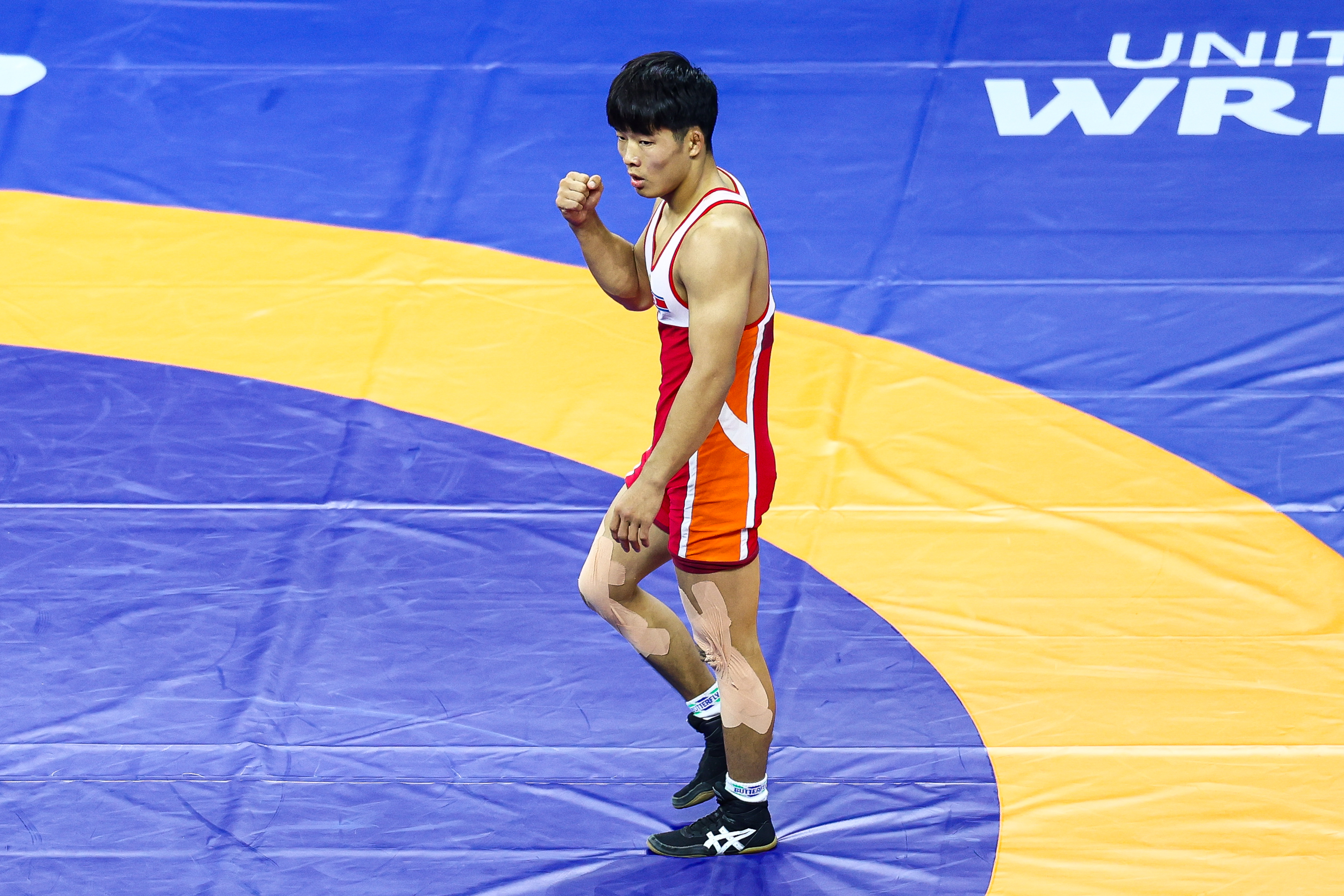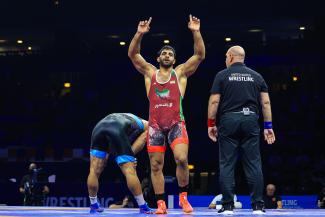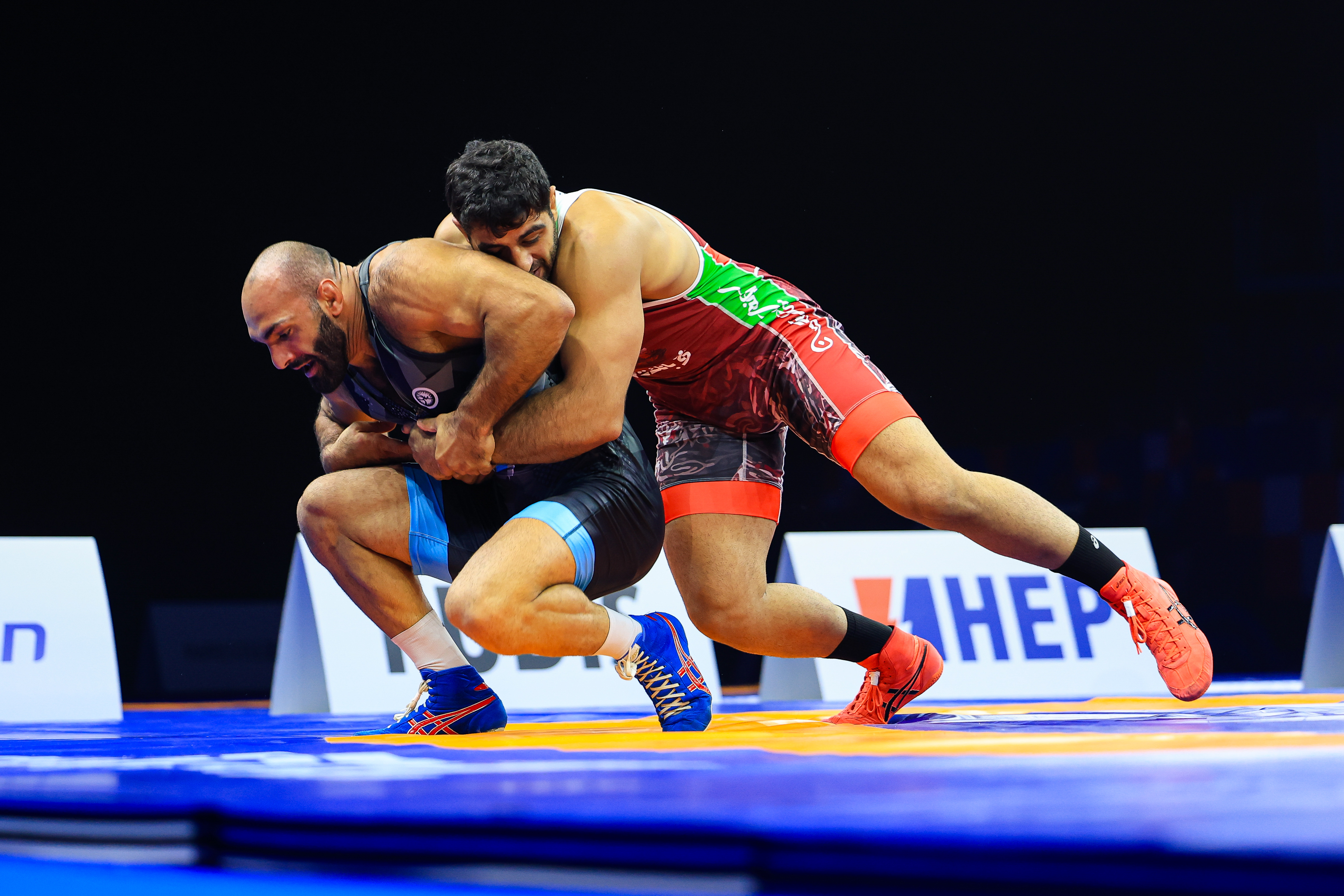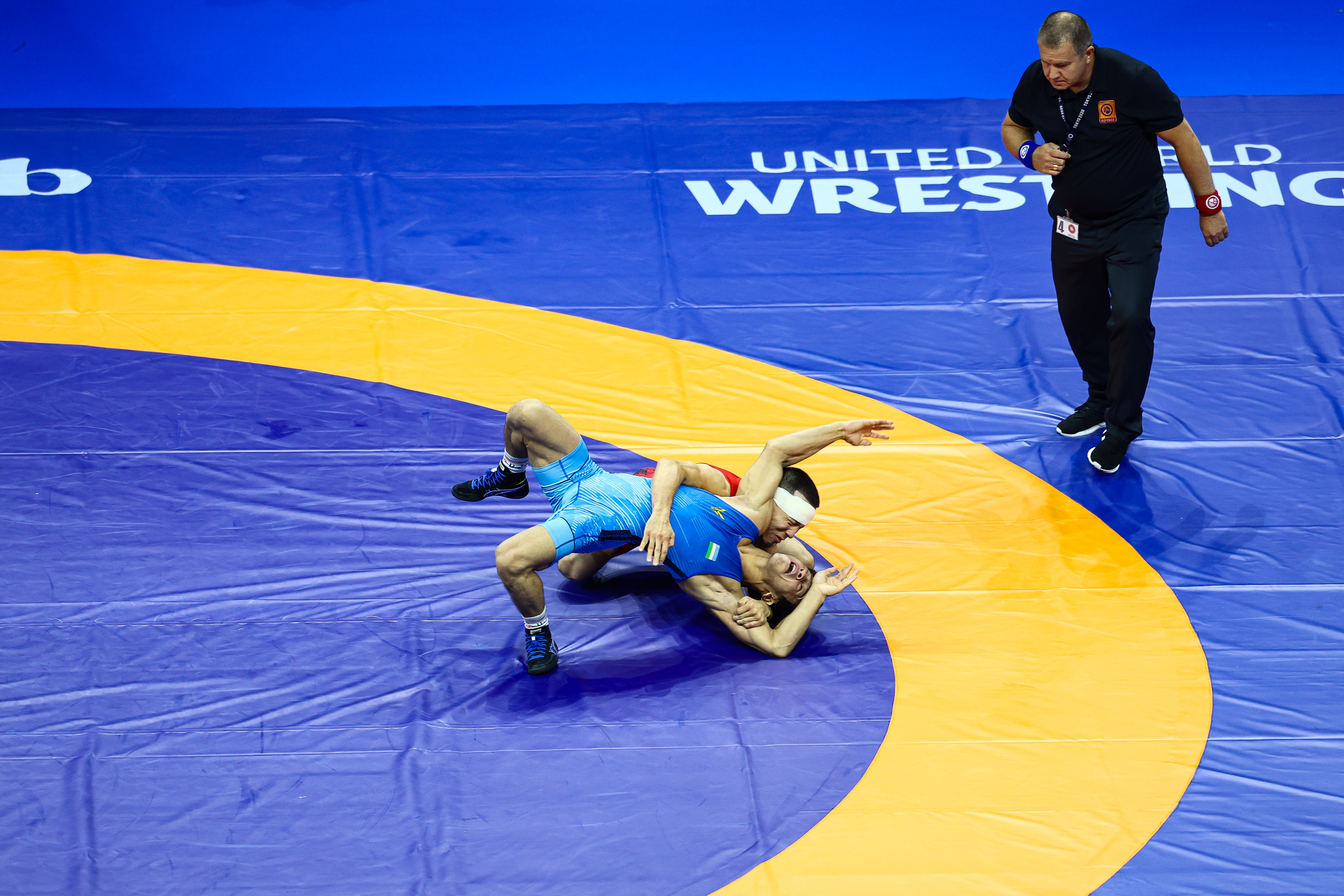The 72kg final evolved into a messy affair when Ganizade was head-butted by Ghanem in the second period, a painful clash that not only drew blood, but induced a 2-point penalty that would be instrumental in the Ganizade's 4-2 victory.
The Egyptian-born Ghanem received the first passivity point in the first period, but could not score. In the second period, Ganizade was put on top in par terre, but he missed on an attempted throw, then was low on a second attempt at the edge.
The Azerbaijan side challenged the call on the second throw, but it was deemed "not a total lift," giving Ghanem a point for a 2-1 lead.
Had Ghanem just rode out the rest of the match, the gold would have been his. Instead, with :42 left, he rammed Ganizade's head, sending Ganizade sprawling to the mat in pain with blood spurting from the cut. The 2-point penalty gave him a 3-2 lead.
As if to add insult to injury, at the restart Ghanem flopped backwards, allegedly from a head to the chin from Ganizade. He challenged, but the match chairman was having none of his shenanigans, saying there was no contact and nixing the challenge to put Ganizade up 4-2.
"The competition was very tough," said Ganizade, a four-time European medalist. "Even though it was difficult, we had prepared a lot for this event and had attended many training camps. Because of the effort I put in, I believed I could become the champion at this competition -- and that is how I became champion."
It was Ganizade's third straight win in four career meetings with Ghanem, who won the world title in 2023. Previous to last year's 3-2 win in the world final, Ganizade pulled out a close 7-7 victory in the final at the 2023 European Championships.
In their first meeting, Ghanem came out on top, winning 2-1 in the first round of the Individual World Cup in 2020, a tournament set up during the pandemic.
"I have now become world champion for the second time," Ganizade said. "I also hope that after this, I will become world champion a third time and make our nation and people proud. For that reason, I will do my best."
As for what lies ahead, he said, "I’m not thinking about anything else yet. I plan to go rest first. After resting, I’ll decide what comes next."
 Se Ung RI (PRK) won a bronze medal at the 60kg weight class. (Photo: United World Wrestling / Jake Kirkman)
Se Ung RI (PRK) won a bronze medal at the 60kg weight class. (Photo: United World Wrestling / Jake Kirkman)
Ri earns 1st Greco medal since 2015 for DPR Korea
In the bronze-medal matches, Paris Olympic bronze medalist Se Ung RI (PRK) gave the DPR Korea its first world Greco medal since 2015 and fourth overall with a victory by fall at 60kg over Amiran SHAVADZE (GEO).
Ri scored a takedown and 2-point throw for a 4-0 lead, then got in deep on a bear hug. When Shavadze tried to counter by lifting up and back, Ri just pressed forward and drove Shavadze to his back for a 4-pointer that would have ended the match anyway by technical superiority. The end came at 2:11 and the scenario was confirmed on challenge.
The other 60kg bronze went to Hrachya POGHOSYAN (ARM), a two-time world U23 bronze medalist who outlasted Georgij TIBILOV (SRB), winning 1-1 by earning the first of the two passivity points awarded in the match.
Both 72kg bronze-medal matches came to early and similar conclusions, with two-time Asian medalist Abdullo ALIEV (UZB) and reigning Asian champion Danial SOHRABI (IRI) both cruising to 8-0 victories for their first senior world medals.
Aliev defeated Yeonghun NOH (KOR), with the decisive points coming from an odd twist in a challenge following a 4-point throw by Aliev.
After scoring an early stepout, Aliev launched his 4-point throw from par terre. The Korean side issued a challenge, which it won -- except that the change was a 2-point leg foul against Noh, which made it an 8-point difference and ended the match at 1:40.
Sohrabi went the more traditional route in defeating Merey MAULITKANOV (KAZ). The Iranian scored only a stepout on a throw attempt while in par terre, but rebounded to put on a six-point spree, finishing with a gut wrench to win in 2:51.
The 97kg bronze-medal matches proved to be wild affairs, with one having the rare occurrence of a fall being nullified on challenge, while the other had a fall confirmed.
Murad AHMADIYEV (AZE) came out on top in a 5-5 decision over Alex SZOKE (HUN) in which the Azeri thought he had reversed to a fall, but was instead flagged for a foul that kept the bout going.
Ahmadiyev started the match with a 4-point arm throw, then stepped over to keep Szoke on his back and nearly secure a fall. The Hungarian side challenged, it was denied and Ahmadiyev led 5-0 going into the second period.
Szoke put the pressure on and gained an activity point, then executed a roll from par terre. But as he tried another, Ahmadiyev suddenly turned to face him and knocked him backward to the mat.
The referee called a fall, but on challenge, a leg foul was detected and Szoke was awarded a 2-point penalty that tied the score, but left him trailing on criteria. Due to the caution, Szoke got another chance at par terre, but couldn't turn Ahmadiyev.
Kiryl MASKEVICH (UWW) saw his fall of Giorgi MELIA (GEO) in the other 97kg bronze-medal match held up after, like Ahmadiyev, he used a stepover to get Melia onto his back.
Melia was on top in passivity, but when he attempted a roll, Maskevich stepped over to put him into a danger position. Melia temporarily spun out, but Maskevich reeled him back in and secured the fall in 1:54. The action was all upheld on challenge.
Day 8 Results
Greco-Roman
60kg (25 entries)
GOLD: Aidos SULTANGALI (KAZ) df. Alisher GANIEV (UZB) by TF, 9-0, 1:07
BRONZE: Se Ung RI (PRK) df. Amiran SHAVADZE (GEO) by Fall, 2:11 (9-0)
BRONZE: Hrachya POGHOSYAN (ARM) df. Georgij TIBILOV (SRB), 1-1
63kg (26 entries)
SEMIFINAL: Hanjae CHUNG (KOR) df. Mohammad KESHTKAR (IRI), 5-3
SEMIFINAL: Aytjan KHALMAKHANOV (UZB) df. Vitalie ERIOMENCO (MDA) by TF, 8-0, :36
67kg (34 entries)
SEMIFINAL: Saeid ESMAEILI (IRI) df. Daniial AGAEV (UWW) by TF, 10-0, 1:44
SEMIFINAL: Hasrat JAFAROV (AZE) df. Razzak BEISHEKEEV (KGZ), 3-1
72kg (30 entries)
GOLD: Ulvu GANIZADE (AZE) df. Ibrahim GHANEM (FRA), 4-2
BRONZE: Abdullo ALIEV (UZB) df. Yeonghun NOH (KOR) by TF, 8-0, 1:40
BRONZE: Danial SOHRABI (IRI) df. Merey MAULITKANOV (KAZ) by TF, 8-0, 2:50
87kg (30 entries)
SEMIFINAL: Alireza MOHAMADI (IRI) df. David LOSONCZI (HUN), 6-3
SEMIFINAL: Aleksandr KOMAROV (SRB) df. Milad ALIRZAEV (UWW), 1-1
97kg (29 entries)
GOLD: Mohammadhadi SARAVI (IRI) df. Artur SARGSIAN (UWW), 3-1
BRONZE: Kiryl MASKEVICH (UWW) df. Giorgi MELIA (GEO) by Fall, 1:54 (5-1)
BRONZE: Murad AHMADIYEV (AZE) df. Alex SZOKE (HUN), 5-5



 Mohammadhadi SARAVI (IRI) scores a takedown on Artur SARGASIAN (UWW) in the 97kg final. (Photo: United World Wrestling / Kadir Caliskan)
Mohammadhadi SARAVI (IRI) scores a takedown on Artur SARGASIAN (UWW) in the 97kg final. (Photo: United World Wrestling / Kadir Caliskan) Aidos SULTANGALI (KAZ) scores a four-pointer on Alisher GANIEV (UZB) in the 60kg final. (Photo: United World Wrestling / Jake Kirkman)
Aidos SULTANGALI (KAZ) scores a four-pointer on Alisher GANIEV (UZB) in the 60kg final. (Photo: United World Wrestling / Jake Kirkman) Se Ung RI (PRK) won a bronze medal at the 60kg weight class. (Photo: United World Wrestling / Jake Kirkman)
Se Ung RI (PRK) won a bronze medal at the 60kg weight class. (Photo: United World Wrestling / Jake Kirkman)
Share your thoughts.
Comments